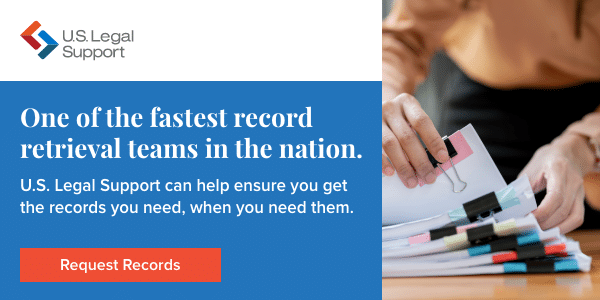A Guide to Medical Record Retrieval

Some documents you collect during discovery and litigation preparation are straightforward—like deeds, trial transcripts, or insurance policies. Medical records, on the other hand, are not always as simple.
From tracking down multiple providers to maintaining HIPAA compliance, the medical record retrieval process can present a drain on staff time or even cause delays in preparation if you keep the process in-house.
Here’s what you need to know about the importance of medical record retrieval and how to approach the process for litigation.
The Importance of Medical Records in Litigation
Patient records illustrate current and past health care provided to individuals—information that can be essential in legal proceedings. Institutional policies, the type of provider and care, and the habits and communication skills of specific physicians all play a role in what information you can expect to receive in a medical record.
So, what is included in medical records? Medical records may contain: 1
- Physician and care facility identification
- Patient identification and billing details
- Current and ongoing diagnoses, complaints, and injuries
- Records of medications, immunizations, and allergies
If you need more detailed information, you may need to request it in addition to the above information. This supplementary information could include:
- Details of a particular condition, surgery, treatment protocol, or date range
- Doctor and nurse notes and visit summaries
- Lab, x-ray, scan, endoscopy, and other test results
- Past conditions, diagnoses, or treatments
- Patient directives such as do not resuscitate (DNR) or health care directives
Two of the main ways medical records are used in litigation are for proof of injury or medical malpractice.
Using Medical Records for Proof of Injury
Whether injury or death results from an assault, environmental cause, workplace accident, or other, medical records can help provide critical details. They’re used to: 2
- Establish the nature and severity of an injury and date of its occurrence or diagnosis
- Detail the treatment prescribed and its results
- Provide information that links an injury by assault to a weapon or environment
Using Medical Records for Medical Malpractice
If an injury arises due to the actions of a healthcare provider, medical records can act as prime evidence to prove it. They can testify to: 3
- Negligence
- Incompetence
- Billing fraud
- Providing unnecessary services or prescription drugs
- HIPAA violations
- Other violations of medical ethics, guidelines, policies, or state and federal laws
What Is Medical Record Retrieval?
Medical records provide the status and history of an individual’s health.
How you obtain medical records depends on the patient’s and providers’ consent. Without consent, you’ll need to show a compelling reason that records are necessary to prove a case and obtain a subpoena or court order.
The retrieval process can be complex and may include multiple rounds of requests to several providers to obtain the information needed during discovery.
How Do I Request Medical Records?
Whether you’re requesting them with or without the patient’s and providers’ consent makes a major difference in the steps for medical records retrieval.
The simplest attorney request for medical records occurs when you have consent, such as in a personal injury case where your client has been injured by another individual. You’ll have your client submit a consent form to each provider to share medical records with you covering what’s needed for the case (date range, treatment, detailed notes, test results, etc.).
However, when you cannot gain consent, you’ll need to start with a subpoena or court order. A judge, magistrate, administrative tribunal, or grand jury must agree that the medical records in question are essential to proving your case, and that overriding the privacy rights of the patient and/or healthcare providers is necessary to serve justice.
A subpoena or court order may be needed to: 4
- Try a criminal case involving billing fraud or other medicine-related crime
- Defend an individual provider or institution from a malpractice suit
- Obtain non-patient-facing records to represent a patient in a malpractice suit
- Defend an employer in a worker’s compensation or other lawsuit claiming injury
- Defend the accused in a medicine- or assault-related criminal case
- Represent an insurance company on either side of a medicine- or assault-related case
How Long Does It Take to Retrieve Medical Records?
While most healthcare providers rely on electronic records, that doesn’t equal one-click access or a 24-hour turnaround. When patient consent is not an issue, steps may include:
- Identify the patient and detail the conditions, treatment, and date range for a request
- Work with the patient and/or insurance company to identify all relevant providers
- Have the patient obtain, fill out, and submit records release forms
- Follow up with each provider’s records department to move the process along
- Re-submit requests if records don’t cover all aspects and details needed
Even with consent, the process may take weeks to complete due to administrative policies. Additional time may be needed if:
- Patient records are declared lost or missing
- A court order or subpoena must be applied for and granted
- A specific period of time is allotted for patient notification and objection
- A patient objection is filed and must be overridden
- The medical provider offers incomplete or apparently altered records
How Does a Retrieval Service Help?
Whether you’re a law firm or an insurance company, partnering with a medical record retrieval company to retrieve medical records for a case can save significant time and resources. A medical record retrieval service partner can:
- Keep you compliant with HIPAA-compliant retrieval practices and a fully secure HIPAA compliant online portal
- Track requests in process and alert you of any updates
- Facilitate follow-up phone calls and back-and-forth communication
- Ensure compliance with state laws and provider policies
- Store records for future access and to prevent loss
Potential Challenges in Medical Record Retrieval
The largest challenge in retrieving medical records is the time spent tracking down information, remaining compliant with HIPAA and state laws, and accommodating multiple providers.
#1 HIPAA Compliance
The Federal Health Insurance Portability and Accountability Act of 1996 (HIPAA) provides uniform requirements for the treatment of medical records. While HIPAA compliance for law firms includes a nationwide protocol on how to request them, it also:
- Limits the access of third parties like lawyers to records without patient consent
- Allows providers to maintain some records not accessible by the patient
- Limits the authorized access of records in third-party cases like legalities
#2 State Laws
As with many federal laws, HIPAA provides a nationwide baseline but does not prohibit individual states from offering additional privacy protection in the patient’s or provider’s interests.
There are 13 states with medical record legislation considered more strict than HIPAA. 5 This can affect record retrieval based on:
- How much time a provider has to respond to a records request
- Additional steps related to notifying patients of third-party requests
- More time allotted for patients to object to records requests
- The right of patients to access their own psychotherapy notes
- Whether a subpoena will suffice or a court order is necessary absent patient consent
#3 Multiple Providers
Even when the medical records are for your client, it may be a challenge to identify all relevant providers for a given condition or injury.
While a patient may recall what hospital emergency room they visited for an event, that’s only the start to tracking down all the providers with individual medical and billing records: hospitals and clinics, surgeons, general practitioners, specialists and consultants, emergency response and ambulance providers, physical and occupational therapists—the list can be long.
Obtaining records without patient consent can multiply this roadblock. You may find mention or suggestion of additional providers or referrals within one record that leads to new requests.
#4 Insufficient Detail
Getting the complete picture from each medical provider can also be a challenge. You may need to request in detail:
- Original doctor notes, vs. patient visit summaries
- Test results including analyses and notes
- Full sets of x-rays, scans, or other test results, vs. highlights or excerpts
- Past medications including dates taken and reason for stopping use
- Patient record of over-the-counter supplements and medications
- Record of past surgeries
- Family history details
Reviewing each record may bring to light a new level of request needed to explore something like the scans and treatment outcome of a prior injury listed, in order to determine whether it’s a contributing factor or not.
#5 Too Much Information
Depending on the type of case and whom you represent, too much information may be just as challenging as too little, particularly when the patient in question is your client. This could include:
- Evidence of past injuries or conditions that may impugn causation
- Inaccurate representation of patient’s presenting complaints
- Patient downplaying pain or severity based on fear or pressure
Partner with the Leader in Medical Records Retrieval
For nearly 30 years, U.S. Legal Support has provided top-notch, inclusive litigation support services including nationwide records retrieval, analysis, and organization.
By the numbers, our team works with a network of over 1.1 million providers, and obtains more than 27 million pages of records annually to fulfill over 400,000 requests—that’s one nearly every twenty seconds, every business day.
We’ll retrieve the records you need, when you need them, and provide secure transfer and storage compliant with SOC 2 Type 2 and HIPAA regulations.
Learn more today about our legal support services and how we can help with your litigation needs.
Sources:
- American Health Information Management Association. Legal Documentation Standards. https://library.ahima.org/Pages/Long%20Term%20Care%20Guidelines%20TOC/Legal%20Documentation%20Standards
- Kansas City Accident Injury Attorneys. How Are My Medical Records and History Used in My Injury Case? https://www.kansascityaccidentinjuryattorneys.com/blog/how-are-my-medical-records-and-history-used-in-my-injury-case/
- Ingerman & Horwitz LLC. Medical Records’ Role in Malpractice Suits. https://www.ihlaw.com/blog/medical-records-role-in-malpractice-suits/
- ChartRequest. HOW DO SUBPOENAS FOR MEDICAL RECORDS WORK? https://www.chartrequest.com/how-do-subpoenas-for-medical-records-work/
- Abyde. State Laws vs HIPAA – What You Need to Know. https://abyde.com/state-laws-vs-hipaa-what-you-need-to-know/

Editoral Policy
Content published on the U.S. Legal Support blog is reviewed by professionals in the legal and litigation support services field to help ensure accurate information. The information provided in this blog is for informational purposes only and should not be construed as legal advice for attorneys or clients.



